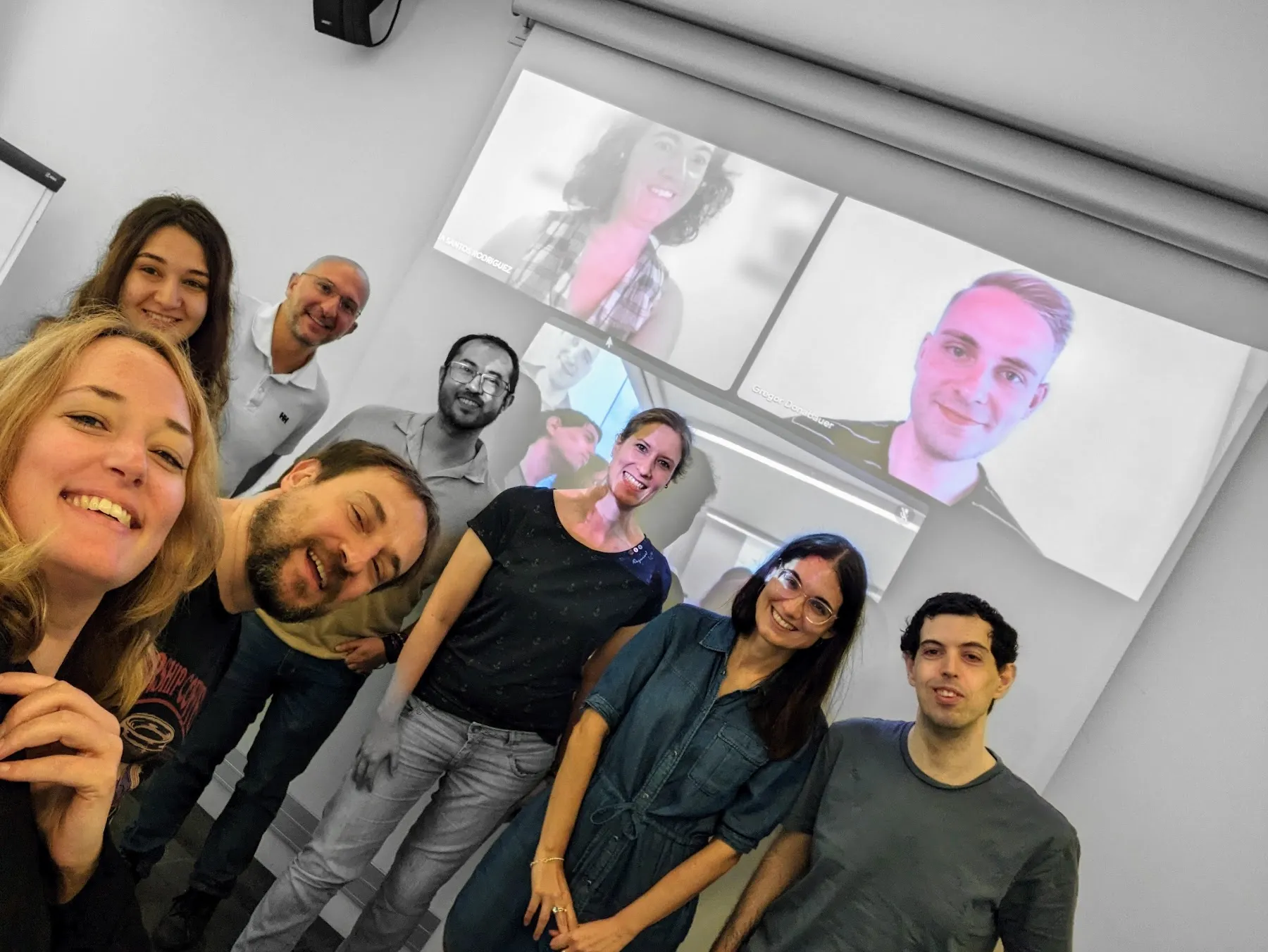
vikunia/Viktoria Cichoń
Virtual companions through digital worlds
A digital companion that supports rather than lectures children and young people and is also entertaining: this is what the interdisciplinary and international consortium "COURAGE" is working on.
Cyberbullying, racism, hate speech and fake news: social media is full of problematic subject matter, especially for children and adolescents. However, constant parental supervision of what their children are exposed to on Instagram, TikTok and Snapchat is neither realistic nor desirable. But perhaps a digital companion could be the answer -- an assistant that recognises and comments on problematic content and at the same time sensitises users so that they do not spread it themselves. The goal of the COURAGE project, which the Volkswagen Foundation is funding as part of its funding initiative ‘'rtificial Intelligence and the Society of the Future’' is to develop such a companion.
COURAGE is being realised by an international consortium involving research groups from Barcelona, Bottrop, Duisburg, Milan, Palermo and Regensburg; Professor Dr Sabrina Eimler from Hochschule Ruhr West in Bottrop is leading the project. And the researchers are convinced it is possible to learn how to deal with virtual worlds much in the same way as you learn to drive a car: with theory and practical practice. The digital companion is designed to help with this.
Positive computing as a basis
Sabrina Eimler conducts research in Bottrop at the interface between society and computer science, psychology, cultural studies, and economics. She has a clear idea of the digital companion: it should be interactive and neither annoying nor patronising. 'Nobody likes a bot that is always interfering without being asked and lectures in a paternalistic way – so nobody would use it.' She follows the 'positive computing' approach. This means designing information and communication technologies in such a way that they are seen to be beneficial, that they take one's autonomy into account and expand skills, but also strengthen empathy and solidarity with others: in other words, roughly the opposite of what only too often happens in social media. 'If you learn to understand how people categorise others, that we all tend to look down on others and differentiate between "us" and "them", then you can consciously act differently. If we succeed in strengthening autonomy, competence, and solidarity in the spirit of positive computing, we may be able to help reduce hateful attitudes and hate speech online," says Eimler, explaining her motivation.

The researchers soon moved away from the original idea of developing a chatbot that would simply run on a mobile phone. In Eimler' view, 'It's one thing to have an idea – and quite another to realise it in such a way that it complies with all standards of protection. That was one of our first realisations: The language is so finely granular that we can't even say exactly when we're dealing with a critical case of an interaction where a human should definitely intervene. We can't solve this problem in passing. But we thought, why wait until we have a perfect product? Why not start with what we can do?'
Interactive workshops
These include, for example, empathy training for younger adolescents, which Veronica Schwarze, a doctoral student in Eimler's working group, developed and evaluated together with Dr Johanna Börsting, also a research associate in the COURAGE project, and the research team from Barcelona. They are trialling the empathy training in the form of a digital learning activity in interactive workshops aimed at school classes. 'Hello,' says Tutxi, the virtual companion of the learning programme, in a speech bubble on the screen. 'I'll be your virtual companion for today's workshop. How are you today?' 'The team was looking for a gender-neutral name that sounds friendly', reports Schwarze. This was suggested by a project partner from Spain.
The children type the answers to Tutxi's questions into a laptop. After a bit of small talk, the virtual companion sets the youngsters simple tasks – in the course of which the learning material is playfully integrated into the conversation. In addition to a video that explains the concept of empathy in an age-appropriate way, the learning material also contains fake posts that could be found on social media. These serve as case studies for the young people to reflect on cyberbullying. To express their opinions and describe their own feelings, they are provided with buttons with predefined answers or they can formulate their answers freely.
Our aim is to expand young people's awareness of racism so that they learn how to deal with discriminatory behaviour in a confident and critical way
In a programme for older youngsters, the aim is to make exclusion visible and sensitise pupils to racist ways of thinking and behaving. To this end, the project team faked adverts in which, for example, a hair shampoo is advertised as being suitable 'for normal and even frizzy hair'. The aim is to address such processes of 'othering' as well as stereotypical ideas about marginalised groups and what is considered the 'norm' in our society. As in empathy training, the content is discussed under the guidance of a virtual facilitator. 'Our aim is to expand young people's awareness of racism so that they learn how to deal with discriminatory behaviour in a confident and critical way,' says Veronica Schwarze. The workshops were followed by discussion rounds with the young people, in which the aims of the project were discussed and they were given the opportunity to express their opinions and impressions. 'They were also offered the opportunity to contact us afterwards if they had any questions or needed to talk, and we pointed out the possibility to use free telephone counselling services available for children, young people and parents such as NummerGegenKummer,' says Schwarze.
More than 330 pupils aged between 11 and 17 in Germany, Spain, Italy, and Brazil have now taken part in the empathy training programme alone. The data was analysed across all countries. Among other things, it showed that the young people in Italy performed significantly better in terms of empathy than their peers in Germany. 'It is particularly valuable for us to engage in direct dialogue with the young people', reports Veronica Schwarze. 'We are pleased to see how interested and enthusiastic they are, and that they find the interaction with the digital companion helpful.'
It should be noted that this is not an AI system. Owing to security concerns, the answers are pre-formulated by the researchers themselves. 'We can't risk an AI saying things that could potentially traumatise the young people,' explains Sabrina Eimler. The way we do it is OK for the youngsters. Chatbots are nothing unusual for them and they like the way the programme interacts – perhaps also because the companion responds with a slight delay, as if it is listening and needs to think first. And they like typing in their own answers. 'It's a change to having a teacher explaining things,' says Schwarze.

By means of quizes and a control group, the researchers wanted to test whether the interaction with the virtual companion Tutxi would make a difference in terms of pupils being able to better recognise racism in postings, for example. 'Unfortunately, this has not been confirmed so far,' reports Eimler. 'Maybe it's due to the special situation in the classroom: we are announced with our topic, so all the children are sensitised – including the control group.'

International and interdisciplinary cooperation
The members of the COURAGE consortium already knew each other from other contexts before they came together as a group for this project. 'Our approach here in Bottrop and the approaches of our colleagues complemented each other perfectly,' reports Eimler, who can still remember how they practised their pitch on the train on the way to the project presentation in Hanover. The project brings together research on learning environments, educational computer science, psychology, human-technology interaction, and artificial intelligence. 'We also had to get used to working in such an interdisciplinary group. We first had to find a common, interdisciplinary language and get to know each other better personally. It was also not so easy to prioritise common topics. In Spain, for example, the topic of body shaming is much more prevalent than here. Our Italian colleagues wanted to focus more on misinformation, while we dealt with racism and discrimination. And the coronavirus pandemic didn't make it any easier, as we weren't able to go into schools for a long time."
If it were up to the teachers they have been working with, the researchers could visit classes much more often to sensitise young people to the problematic content. The need is great. 'But as researchers, we simply don't have enough time to do that,' Eimler realises. As a next step, she would therefore like to see providers of educational media bring the COURAGE prototypes onto the market as apps so that schools can purchase and use them.
Selected Publications
Theophilou, E. et al. (2023). Empirically Investigating Virtual Learning Companions to Enhance Social Media Literacy. In: Fulantelli, G., Burgos, D., Casalino, G., Cimitile, M., Lo Bosco, G., Taibi, D. (eds) Higher Education Learning Methodologies and Technologies Online. HELMeTO 2022. Communications in Computer and Information Science, vol 1779. Springer, Cham. https://doi.org/10.1007/978-3-031-29800-4_27
Taibi, D. et al. (2023). The Role of Educational Interventions in Facing Social Media Threats: Overarching Principles of the COURAGE Project. In: Fulantelli, G., Burgos, D., Casalino, G., Cimitile, M., Lo Bosco, G., Taibi, D. (eds) Higher Education Learning Methodologies and Technologies Online. HELMeTO 2022. Communications in Computer and Information Science, vol 1779. Springer, Cham. https://doi.org/10.1007/978-3-031-29800-4_25

